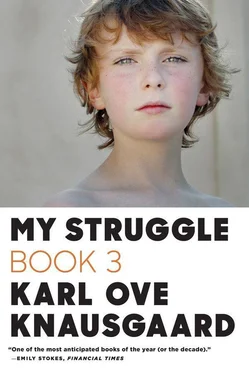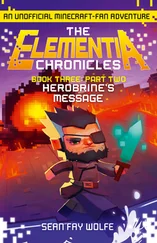“Come by here, my cows!” he sang. “Kum by ya! Kum by ya!”
How could I tell my friends at home about all this when they asked where we had been and what we had done over the holidays? It was impossible, and it was supposed to be impossible, there was a Chinese wall between the two worlds, both in my mind and the world outside.
In the two weeks we were there the unfamiliar became familiar and homely, while home, after a long day of traveling by car, had become unfamiliar, or had been lowered into the pool of unfamiliarity, for as we drove down the hill after Tromøya Bridge and turned into the last stretch up to the house, brown with red frames, surrounded by a lawn parched and scorched, the dark windows staring at us through sorrowful eyes, it was as if I both recognized it yet didn’t, because although my gaze was accustomed to all it saw, it put up some resistance, a bit like a pair of new sneakers can, lying there, gleaming in their un-used-ness and, as it were, refusing to adapt to their latest surroundings, insisting on their distinctive character, until the resistance has been worn down over a few weeks and they are just one pair among many. Some of this feeling of newness was conferred on the estate when we arrived, it had been stirred up, so to speak, and wasn’t to settle for quite a few days.
Dad parked and switched off the engine. A little white kitten lay sleeping on Mom’s lap. It had meowed and squealed in the cage all morning, and when it was finally let out it had run around the back seat and on the ledge under the rear window until Mom caught it and at last it fell asleep and was quiet. It had completely red eyes, and although its coat was big and furry, underneath it was tiny. Especially the head, I thought as I was petting it and felt the small cranium in my hand, but also the neck. It was so thin.
“Where’s Whitie going to live?” I said.
“Oh, what a name,” Dad said, opening the door and getting out.
“We’ll have to give it a room in the cellar,” Mom said, lifting the kitten to her bosom with one hand and opening the door with the other.
Dad pulled the seat forward and I stepped out onto the gravel, my legs like jelly. Yngve got out on the opposite side, and together we followed Dad to the house. He unlocked the door and went into the laundry room, where he opened the hatch and poked the hose through. He screwed the other end to the tap, and then he walked out with the sprinkler in his hand while Mom, Yngve, and I went into the cellar storeroom, where the kitten, who was still sleeping, was given a basket with a blanket in it, a bowl of water, and a bowl containing some pieces of sausage from the fridge, and then we put a low, plastic tray of sand in the corner.
“Now we’ll close all the doors except this one,” Mom said. “So he can’t run away when he wakes up.”
While the thin jets of water from the sprinkler rotated around the lawn and Dad carried in the baggage from the car below us, Yngve, Mom, and I sat having supper in the kitchen. It was Sunday, all the shops were closed, and so Mom had brought a loaf and some butter, meat, and cheese from Sørbøvåg. We drank tea; I had it with milk and three spoonfuls of sugar.
Suddenly we heard the kitten squeaking from the hallway. We got up, all of us, and went out. He was at the top of the stairs. On seeing us, he ran down again. We followed. Mom called him. He shot across the floor, darted past us, bounded up the stairs and into the living room, where he hid. For several minutes we went around searching and calling until Yngve found him. He was in the narrow gap between the bookcase and the wall, impossible to reach unless you moved the whole bookcase.
Mom went downstairs to fetch the bowls of food and water, put them beside the bookcase, and said he would come out when he wanted them. When I went in next morning he still hadn’t moved. In the evening he came out and ate something, then he disappeared again. He stayed there for three days. But when he did eventually come out it was for good. He was still a bit jittery at first, but he got more and more used to us and after a week he was running around and playing and jumping onto our laps and purred whenever we stroked him. Every evening he stood in front of the TV smacking whatever appeared on the screen with his paw. He was particularly interested in soccer. He ignored all the players, he only had eyes for the ball, which he watched with the utmost attention. Now and then he padded behind the TV set to look for it.
When school started again, he began to cough. It was comical, it sounded as if there were a person downstairs in the cellar. Slowly and imperceptibly, the mornings became cooler until one day there was a thin, glassy layer of ice on the puddles in the road, which had melted after a few hours, but nevertheless autumn was at the door. The leaves on the trees straddling the hill above our house turned yellow and red and spiraled down from the branches when the wind gusted in. Mom was unwell and in bed when I left for school in the morning and returned some hours later. I went in to talk to her and she could barely raise her head. At the same time Whitie fell ill; he lay in his basket coughing. At school I kept wondering how he was and on my return the first thing I did was to go into the cellar storeroom. If only he would get well soon! But the opposite happened, he got worse and, one day when I ran in to see him, he wasn’t in his basket but in the corner, on the concrete floor, writhing to and fro and wheezing. I placed my hand on him, but he kept on writhing.
“Mom! Mom!” I shouted. “He’s dying! He’s dying!”
I flew up the stairs and wrenched open the door to her room. She turned sleepily to me with a smile.
“You’ve got to call for a vet!” I shouted. “Right now! It’s urgent!” She sat up gingerly.
“What’s going on?” she said.
“Whitie’s dying! He’s writhing around on the floor. He’s in so much pain! You’ve got to call for a vet! At once!”
“But we can’t, Karl Ove,” Mom said. “I don’t think anything will help. And I’m not well …”
“You’ve got to call now!” I shouted. “Mom, Mom, he’s dying! Don’t you understand?”
“I can’t, don’t you understand. I’m sorry. It’s terrible.”
“But Whitie’s dying !”
She gently shook her head.
“But Mom!”
She sighed.
“He was probably already ill when we took him with us. He’s an albino as well. They’re often a bit weaker. There’s nothing we can do. Nothing.”
I looked at her with my eyes full of tears. Then I slammed the door and ran down to the cellar. He was lying on his side, pulling himself along by his claws on the floor and wheezing. Spasms shook through him. I bent down and stroked him. Then I ran out, down into the forest, right down to the water. Up again on the other side. Crying nonstop. When our house came into sight again I ran as fast as I could, I had to try and persuade her again. She wasn’t a vet, what did she know about what they could or couldn’t do? I opened the door and paused. Inside the house there was silence. Carefully, I crept into the storeroom. He was back in his basket, lying still, with his head rolled back.
“Mom!” I yelled. “Come here!”
I dashed up the stairs and opened the door to her room again.
“He’s not moving,” I said. “Could you check to see if he’s dead? Or if he’s recovered.”
“Do you think you can wait until your father comes?” she said. “He won’t be long.”
“No!” I said.
Mom stared at me.
“OK, I can do it,” she said. She lifted the duvet, placed her feet on the ground and stood up, all at the same slow speed. She was wearing a white nightgown. Her hair was in a mess, her face pale and softer than when she was well. She steadied herself with one hand against the wardrobe. I ran downstairs and waited for her outside the storeroom. I didn’t want to be inside on my own.
Читать дальше












